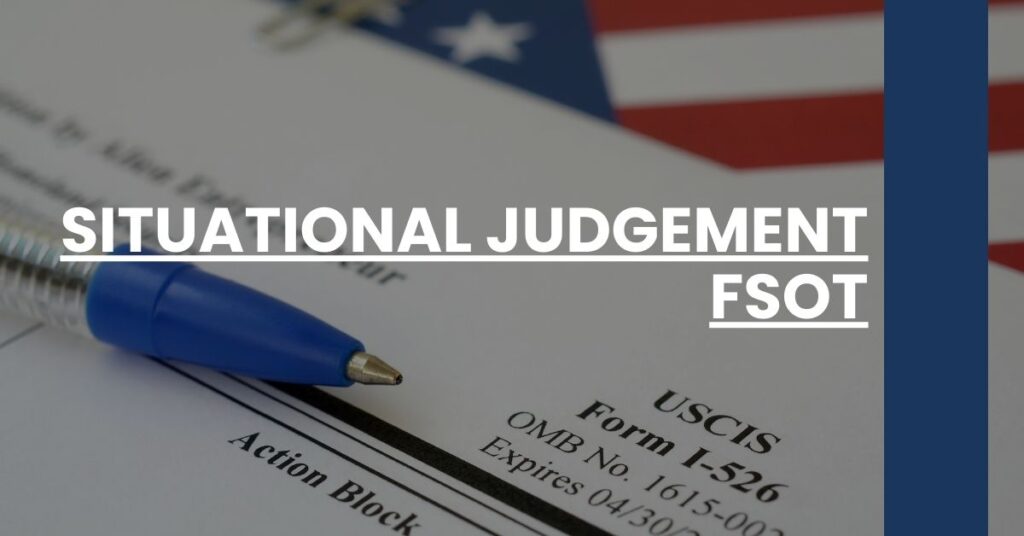Situational judgement on the FSOT assesses a candidate’s ability to handle realistic diplomatic scenarios. It is a key part of the exam that examines decision-making skills crucial for a Foreign Service Officer.
Expect scenarios requiring:
- Adaptability
- Teamwork
- Problem-solving abilities
Mastering situational judgement on the FSOT can pivot your diplomatic career path forward. And with targeted preparation highlighting your relevant skills, your chances of success can soar.
- Understanding Situational Judgement Tests (SJTs)
- The Role of SJTs in the FSOT
- Components of FSOT’s Situational Judgement Section
- Scoring Mechanism for Situational Judgement in FSOT
- Key Skills Evalitated in the Situational Judgement Section
- Strategies for Excelling in Situational Judgement Tests
- The Significance of Practice for the SJT Section of FSOT
- Analyzing Sample SJT Questions for the FSOT
- Conclusion: Preparing for Success in the FSOT’s Situational Judgement Section
Understanding Situational Judgement Tests (SJTs)
When preparing for the Foreign Service Officer Test (FSOT), you’ll encounter a component designed to probe your decision-making abilities and interpersonal skills—this is the situational judgement test, or SJT for short. SJT is a psychological assessment tool that presents you with hypothetical, yet realistic, work-related scenarios and asks how you would handle them.
- Realism: These scenarios often mirror challenges you might face in your career as a diplomat.
- Assessment: Your responses reveal key traits such as your problem-solving capability, ethical judgment, and teamwork.
- Soft Skills: SJTs are especially tuned to evaluate intangible attributes that are not readily captured by other test components, but are essential in the field of diplomacy.
Why Are SJTs Important?
For roles in the Foreign Service, where you’ll be navigating complex cultural contexts and responding to real-time challenges, your cognitive and behavioral readiness is just as vital as your factual knowledge. This test gauges your preparedness for such nuances and, crucially, your potential to grow into the multifaceted responsibilities of a Foreign Service Officer.
Understanding the significance of these traits can be paramount for your success not only in the FSOT but also in your future career.
The Role of SJTs in the FSOT
The Foreign Service Officer Test isn’t just about assessing your recall of international affairs or your command of English grammar. Woven into its fabric is the situational judgement section, a tool meticulously designed to filter for the intangible—yet critical—skills that define an effective Foreign Service Officer (FSO). This section stands as a proving ground for your interpersonal acuity and decision-making aptitude in the face of complex, often ambiguous, scenarios that you’re bound to encounter as an FSO.
So, why does this matter to you? As an aspiring FSO, these are the everyday competences you’ll be expected to demonstrate:
- Persuasion in multifaceted negotiations,
- Adaptability in the face of unforeseen events,
- Integrity when ethical dilemmas arise, and,
- Collaborative spirit within diverse teams.
Integrating these competencies into your skillset is what makes you not just a capable exam candidate, but also a valuable asset to U.S. diplomatic efforts. Your performance on this part of the FSOT sets the stage for a career where the ability to judge situations effectively can have global repercussions.
Components of FSOT’s Situational Judgement Section
Navigating through the situational judgement section of the FSOT can feel like running a diplomatic gauntlet. You’ll be faced with 28 scenarios, each one a unique challenge demanding your best judgment within a tight 42-minute timeframe. The test ingeniously simulates the pressures of diplomatic life—where rapid, yet wise, decisions are often the order of the day.
Types of Questions You’ll Encounter:
- Problem Resolution: Here, you’ll demonstrate your proficiency in dissecting an issue and presenting viable solutions.
- Interpersonal Negotiations: These questions assess your skill in managing interpersonal dynamics, easing tensions, and fostering cooperation.
- Prioritization: Faced with competing demands, you’ll show your prowess in identifying and acting on what’s most critical.
- Policy Implementation: Given a policy framework, your task is to demonstrate how you’d ensure its effective execution.
To succeed, you’ll need to step into the shoes of an FSO and view each scenario through a lens shaped by both protocol and empathy, a duality that epitomizes the essence of diplomacy.
Preparing with the right mindset is a significant step towards mastering this section. Picture yourself in the scenarios and consider not just what an effective diplomat would do, but also why.
Scoring Mechanism for Situational Judgement in FSOT
How your situational judgement is appraised in the FSOT could appear arcane, but it’s founded on a fairly straightforward premise: there’s typically a most effective course of action given the context of the situation, and that’s what you’re being scored against. Your responses are compared to a benchmark set by experienced diplomats, and this provides a gauge for your suitability as a future FSO.
Key Points in the Scoring Mechanism:
- Consensus-Based: The ‘correct’ answers are those agreed upon by a panel of seasoned foreign service professionals.
- Point Allocation: Each answer is worth a certain number of points; the closer your choice is to the panel’s, the more points you receive.
- Overall Impact: While it’s one of several components, a strong performance in the situational judgement section can be a decisive factor, especially if the results are close.
While the exact scoring algorithms are kept under wraps, your objective remains clear—align your choices with the best practices of the diplomatic corps and demonstrate that your judgment is in sync with the expectations of the profession.
Remember, these scores are more than just numbers; they reflect your potential to navigate the multifaceted waters of international relations with discernment and finesse.
Key Skills Evalitated in the Situational Judgement Section
The situational judgement section of the FSOT is a litmus test for a set of nuanced skills—those that define the essence of effective diplomacy. As you prepare, it’s critical to understand and refine the competencies you’ll need to display.
Highlighted Skills:
- Adaptability: Diplomacy is dynamic, and your ability to adjust to shifting situations is paramount. Embrace changes and show that you can think on your feet in unanticipated circumstances.
- Decision Making: You will often find yourself at the crossroads of complex choices. Your task is to demonstrate sound judgement that aligns with the ethical and operational standards of the Foreign Service.
- Operational Effectiveness: Efficiency is key in handling the workload of an FSO. Show that you can prioritize tasks and delegate effectively without sacrificing quality.
- Professional Standards: It’s vital that your actions uphold the integrity and values expected of diplomats. Your responses should reflect a strong moral compass and a commitment to ethical conduct.
- Team Building: An FSO is rarely a lone wolf. Showcase your ability to foster collaboration and cultivate a team-oriented environment, even when working across cultures.
- Workplace Perceptiveness: Practice reading between the lines. The ability to interpret nuanced social cues and react appropriately is a subtle, yet powerful, diplomatic tool.
In sharpening these skills, you’re not merely aiming for a strong test score—you’re building the foundation of your career in foreign service. By integrating these abilities into your decision-making process, you’re demonstrating to the FSOT panel a clear aptitude for the multifaceted role of an FSO.
To hone these skills further, you might find it useful to engage with online resources, like those offered by Path to Foreign Service, which details the intricacies of the situational judgement FSOT section and provides strategies for success.
Strategies for Excelling in Situational Judgement Tests
Preparing for the situational judgement FSOT requires more than just a cursory look at sample questions. It’s about deeply understanding the role of an FSO and aligning your thought process with the responsibilities the job entails.
Preparation Tips:
- Research Thoroughly: Take time to learn about the day-to-day demands and expectations of an FSO. Your responses should reflect an understanding of the role and its complexities.
- Practice with Variety: Engage with a broad spectrum of SJTs to acquaint yourself with different scenarios and response types. This will build your confidence and improve your decision-making speed.
- Reflect the Employer’s Values: Remember that each choice should mirror the core values of the U.S. Department of State.
- Cultivate Desired Traits: Highlight your reasoning skills, integrity, and diplomatic tact through your answers.
Remember, there are seldom clear right or wrong answers in SJTs. Reflect on your responses and think critically about why one may be more effective than another in the given context.
Seek out additional strategies and insights on AssessmentDay to ensure that your preparation is as robust as possible.
The Significance of Practice for the SJT Section of FSOT
Practice is the cornerstone of excellence in any area, and the situational judgement section of the FSOT is no exception. Frequent and targeted practice with SJT questions can bridge the gap between your innate decision-making style and the expectations of the test.
Importance of Practice:
- Familiarization: Knowing what types of dilemmas you might face reduces anxiety and helps you approach the test with a clearer mind.
- Speed: Time is limited. The more you practice, the quicker you’ll become at evaluating scenarios and deciding on a course of action.
- Accuracy: Continuous exposure to SJT scenarios sharpens your instinct for selecting the most appropriate response against the benchmark of experienced FSOs.
As you immerse yourself in sample tests and scenarios, pay attention to areas where you may struggle and target those specifically in your practice sessions. It is essential that you approach your preparation with an active mindset, analyzing your choices and understanding the underlying reasoning.
The value of practice cannot be overstated, and you can find supporting evidence and tips to get started on Practice Aptitude Tests, which underscores how practicing diverse SJT questions is critical for success.
Analyzing Sample SJT Questions for the FSOT
Understanding the structure and content of SJT questions is important, but unraveling the reasoning behind each potential answer is where the true learning occurs. Let’s dissect a few sample questions to see how best to approach them.
- Scenario: Suppose you’re at a diplomatic event and you notice a small group of attendees from a key regional ally who appear disengaged. How do you respond?
- Scenario: You receive conflicting instructions from two superiors on how to proceed with an important report. What’s your next step?
As you work through these examples, you’ll discover the thought patterns that yield effective diplomatic action. Interrogate the rationale behind each potential response, considering the short and long-term implications of your decisions.
For further analysis of sample questions, keep an eye out for resources like those available at Path to Foreign Service, which can offer a focused walkthrough for various scenarios.
Conclusion: Preparing for Success in the FSOT’s Situational Judgement Section
The journey to acing the situational judgement FSOT section is demanding, but with intentional preparation, it’s within your grasp. Embrace the challenge. Each sample question you parse and each scenario you deconstruct brings you one step closer to embodying the quintessential qualities of an exceptional Foreign Service Officer.
Remember, every response on the test is a chance to exhibit your fitness for the kind of complex, nuanced decision-making that lies at the heart of diplomacy. Use your preparation time to ensure that when the day comes, you’re not just ready for the test—you’re ready for the career that awaits.
In summary, the situational judgement test on the FSOT is not merely about selecting the ‘right’ answer; it’s about demonstrating the qualities that signify your potential as a diplomat. Approach the test as a diplomat would approach a negotiation: with preparation, perception, and a resolve to align with the highest professional standards. The FSOT is your gateway to the global stage of international relations—make your judgement count.
Explore the situational judgement FSOT section with our expert insights on scoring, practice strategies, and key skill evaluation.

